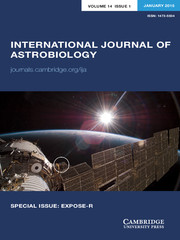Article contents
Where no planetary protection policy has gone before
Published online by Cambridge University Press: 26 July 2018
Abstract
I argue that the attempts of astrobiologists and philosophers to provide an ethical justification for planetary protection policies (in particular, those aspects of policy concerning forward contamination) suffer from a ‘life bias’ in that reasons for protection are regarded as genuinely ethical only when they include some kind of direct moral consideration for extraterrestrial life. There are, I maintain, good reasons for the protection of space environments, including the protection of sites of interest to disciplines other than astrobiology. These reasons are no less ethical simply because their aim is something other than the protection of extraterrestrial life. While the possible existence of such reasons has been recognized, they have yet to be developed in a philosophically satisfying way. This paper aims to fill this lacuna by motivating and articulating an ethical perspective which recommends broader protection of the space environment. Long-range implications for such a broadening of planetary protection are considered, including implications for interstellar exploration.
Keywords
- Type
- Research Article
- Information
- Copyright
- Copyright © Cambridge University Press 2018
References
- 5
- Cited by


